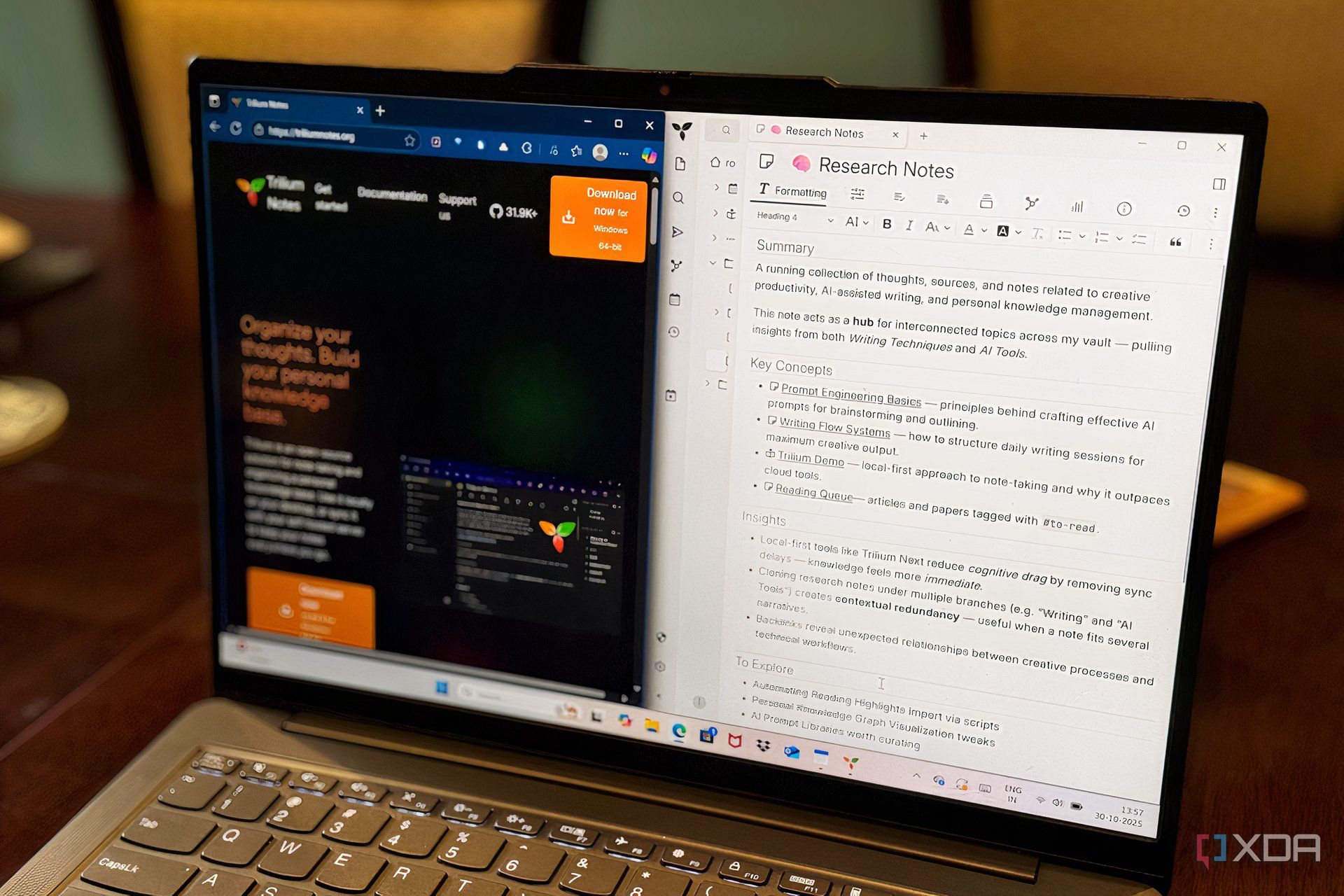Top Stories
User Ditches Notion for Trilium Next in Urgent Knowledge Base Shift

UPDATE: A significant shift in the productivity software landscape is underway as users are abandoning Notion for Trilium Next, a self-hosted knowledge management tool. This transition highlights urgent concerns regarding Notion’s speed and internet dependency, prompting users to seek faster, more responsive alternatives.
Frustrated by constant loading delays and server dependency, users are migrating to Trilium Next, which operates entirely on local machines. This free, open-source app promises instant access to notes, eliminating the lag that plagues Notion. “When you’re capturing ideas mid-conversation, three seconds of lag feels like an eternity,” one user remarked, emphasizing the pressing need for immediate access to information.
The switch isn’t merely about preference; it’s about functionality. Trilium Next’s local storage capability means users can retrieve notes in milliseconds, a stark contrast to Notion’s dependency on server communication. One user described their experience: “Notes load instantly. Searches return results before I finish typing.” This responsiveness transforms knowledge management from a sluggish archive into an active workspace.
Many users are finding that the mental shift to self-hosting isn’t as daunting as it sounds. The installation process is straightforward, taking just about five minutes on Windows, macOS, or Linux, allowing users to gain control over their data without complicated configurations. “No cloud account. No credit card. Just a functioning knowledge base,” said a satisfied user.
Trilium Next offers features that cater to a range of users. For researchers and writers, the app’s hierarchical organization allows for multi-location note storage through “clones,” enabling seamless updates across different categories without duplicating content. This flexibility addresses a common frustration with traditional note-taking apps, where information rarely fits neatly into a single category.
The platform’s ability to integrate JavaScript allows users to automate tasks and build custom functions, making it a powerful tool for those willing to learn basic scripting. “For developers and power users, this extensibility is liberating,” noted a user who has embraced the platform’s capabilities.
While the migration from Notion to Trilium Next presents its challenges—such as formatting issues during data transfer—the benefits often outweigh the inconveniences. Users report that overcoming the initial learning curve leads to lasting improvements in their productivity and knowledge management efficiency.
However, Trilium Next may not be suitable for everyone. Users who thrive in collaborative environments may find Notion’s real-time editing and sleek design more appealing. Notion’s interface is often praised for its visual appeal, while Trilium Next leans towards function over form.
As more users recognize the value of speed and ownership in knowledge management, the trend towards self-hosted solutions like Trilium Next is likely to grow. With the promise of immediate access and enhanced control over data, this shift represents a significant development in how individuals manage their knowledge.
For writers, researchers, and developers, this transition is more than just a software change; it’s a paradigm shift that underscores the need for speed and efficiency in managing ideas. As one user aptly put it, “Trilium Next taught me that knowledge management can be fast.”
As this trend develops, expect to see more discussions around the implications of self-hosted solutions in productivity and knowledge management.
-

 Top Stories1 week ago
Top Stories1 week agoMarc Buoniconti’s Legacy: 40 Years Later, Lives Transformed
-

 Sports3 weeks ago
Sports3 weeks agoSteve Kerr Supports Jonathan Kuminga After Ejection in Preseason Game
-

 Politics3 weeks ago
Politics3 weeks agoDallin H. Oaks Assumes Leadership of Latter-day Saints Church
-

 Business3 weeks ago
Business3 weeks agoTyler Technologies Set to Reveal Q3 2025 Earnings on October 22
-

 Science3 weeks ago
Science3 weeks agoChicago’s Viral ‘Rat Hole’ Likely Created by Squirrel, Study Reveals
-

 Lifestyle3 weeks ago
Lifestyle3 weeks agoKelsea Ballerini Launches ‘Burn the Baggage’ Candle with Ranger Station
-

 Lifestyle3 weeks ago
Lifestyle3 weeks agoDua Lipa Celebrates Passing GCSE Spanish During World Tour
-

 Entertainment3 weeks ago
Entertainment3 weeks agoZoe Saldana Advocates for James Cameron’s Avatar Documentary
-

 Health3 weeks ago
Health3 weeks agoRichard Feldman Urges Ban on Menthol in Cigarettes and Vapes
-

 Health3 weeks ago
Health3 weeks agoCommunity Unites for Seventh Annual Mental Health Awareness Walk
-

 Sports3 weeks ago
Sports3 weeks agoPatriots Dominate Picks as Raiders Fall in Season Opener
-

 Business3 weeks ago
Business3 weeks agoMega Millions Jackpot Reaches $600 Million Ahead of Drawings








